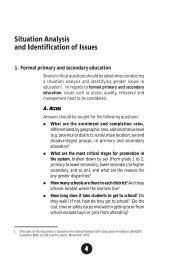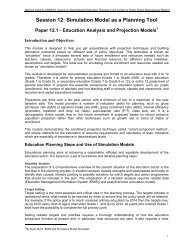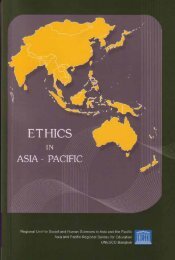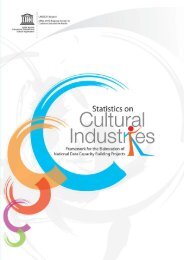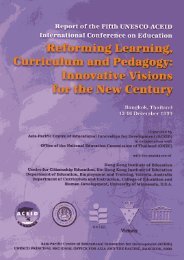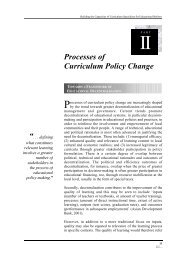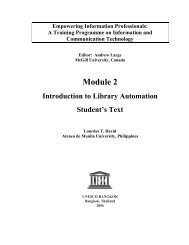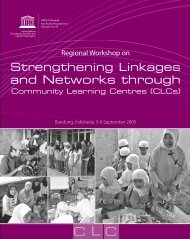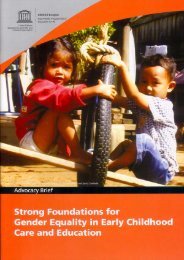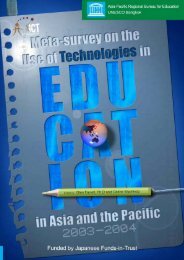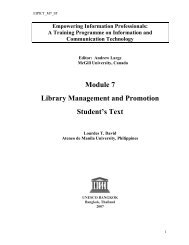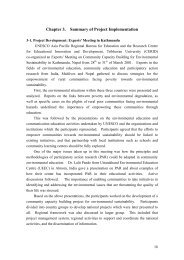In 1958, <strong>UNESCO</strong>’s 10 th General Conference passed a resolution callingfor “preliminary studies in 1959-1960 with a view to initiating a MajorProject on the extension of compulsory primary education in Asiancountries” (<strong>UNESCO</strong>, 1958, 10 C/Resolutions, Annex I, para. 53). Thereport of that study was delivered to participants prior to the RegionalMeeting of Representatives of Asian Member States on Primary andCompulsory Education held in Karachi, Pakistan, 28 December 1959 to9 January 1960. This meeting gave birth to the first comprehensiveregional co-operative effort in promoting universal primary educationthroughout Asia: what became known as the Karachi Plan.Representatives of the Member States 5 meeting in Karachi were firstpresented with a litany of facts and figures as to the sad state of educationin each of their countries. Ananda Guruge, then a young educationistfrom Sri Lanka, recalled that “the figures seemed to say everything…theyexplained our poverty, our backwardness, and our shamefulcomplacence” (Guruge, 1986, p. TWO/20). He goes on to tell howMalcolm Adiseshiah, then Assistant Director-General of <strong>UNESCO</strong>, and aman of charisma, rose to pull the delegates back to a more optimisticvision of the new world before them - a world that could and would betheirs for the making.In the end, the Karachi Plan called for no less than the “provision ofuniversal, compulsory and free primary education in Asia” (<strong>UNESCO</strong>,1960, p. 31). Furthermore, the representatives agreed that these goals forthe first seven years of schooling were to be achieved in just twenty yearsi.e. by 1980! The enthusiasm of independence seemed to engender thebelief that anything was possible. Even though today, forty years later,the goal of universal primary education is still elusive, the greatsignificance of the Karachi Plan is that the commitment had been made.As Acting Director-General of <strong>UNESCO</strong> Rene Maheu later remarked,“The Karachi Conference…marks an epoch in the history of <strong>UNESCO</strong>(sic). Indeed, for the first time, educators at the highest level in theirrespective countries made joint proposals to the governments of a vastregion; proposals definite both in quantity and quality, [to be] realizedwithin a definite time limit” (<strong>UNESCO</strong>, 1962, p. 45).__________________________5. The countries represented at Karachi included Afghanistan, Burma, Cambodia, Ceylon, China(Nationalist Republic), India, Indonesia, Iran, Japan, Korea, Laos, Malaya, Nepal, Pakistan,Philippines, and Thailand.The Karachi Plan proposed that regional institutes be established to trainkey educators as a means of building national capacities. Indeed, thehallmark of educational development in the 1960s was capacity building,The Building Blocks © 5
and this became a foundation stone of educational innovation fordevelopment in the region. Specifically, the Karachi Plan called for theestablishment of three Regional Institutes: one for planning andadministration in New Delhi, India; one for training teacher educators inQuezon City, Philippines; and one for school building research, originallylocated in Bandung, Indonesia and later moved to Colombo, Sri Lanka.The Institutes were to be co-ordinated by a regional office in <strong>Bangkok</strong>.The idea was for these three to operate under the <strong>UNESCO</strong> banner for aten-year period and then be taken over by their respective nationalgovernments.Shortly after the meeting in Karachi, in 1961, a prominent Pakistanieducator, Dr A.F.M.K. Rahman was given the job of starting up theregional office for <strong>UNESCO</strong> in <strong>Bangkok</strong>, Thailand. In just eighteenmonths of tireless effort and thousands of miles of travel, Dr Rahman, aslight man of tremendous energy and total dedication to the ideals of<strong>UNESCO</strong>, succeeded in negotiating agreements with the governments ofIndia, Indonesia, the Philippines and Thailand regarding the soon-to-beRegional Institutes. Thus began <strong>UNESCO</strong>'s Regional Institute Model ofeducational development in Asia.The Tokyo Extension and the Asian ModelThe next significant step was in April 1962, with the Tokyo Meeting ofMinisters of Education of Asian Member States Participating in theKarachi Plan. The purpose of the meeting was "to stimulate andco-ordinate the action of cooperating agencies in the extension of primaryand compulsory education in Asia" (<strong>UNESCO</strong>, 1962, p.1). Afterreviewing the progress made by individual countries in the first two yearsof the implementation of the Karachi Plan, and after hearing of thesuccessful establishment of the three Regional Institutes and the RegionalOffice in <strong>Bangkok</strong>, the representatives in Tokyo called upon eachMember State to develop a detailed, long-term national education plan,covering all levels of education, and submit it to the <strong>UNESCO</strong> RegionalOffice in <strong>Bangkok</strong>.Of the several major amendments to the Karachi Plan, the most importantbecame known as the 'Tokyo Extension'. It reflected a realization thatother aspects of educational systems must be addressed at the same timeas the expansion of primary education. The Conference Report makesclear that "the Karachi Plan is an essential first stage---it must beextended to cover all levels of education---primary, secondary, higherand adult---in each of our countries" (<strong>UNESCO</strong>, 1962, p. 38). This was amonumental upgrading of the original commitment.The delegates at Tokyo then called upon the <strong>UNESCO</strong> Regional Officein <strong>Bangkok</strong> to compile the information that each Member State would be6 © Snapshots of Primary and Secondary Education in Asia-Pacific
- Page 5 and 6: P r e f a c eIn responding to the m
- Page 7 and 8: List of AbbreviationsACEIDADBAECAPE
- Page 9 and 10: C O N T E N T SPrefaceList of Abbre
- Page 11 and 12: Pakistan28. In-service Teacher Educ
- Page 13 and 14: Projects from 14 countries are incl
- Page 15: ability to make a regional contribu
- Page 19 and 20: systematic and sustained way for mu
- Page 21 and 22: ReferencesACEID (1998), ACEID News,
- Page 23 and 24: project in Higher Secondary Educati
- Page 25 and 26: Models of Educational InnovationA d
- Page 27 and 28: was clearly a main goal of the cons
- Page 29 and 30: Innovation in primary and secondary
- Page 31 and 32: Schwab, J (1969), The practical: A
- Page 33 and 34: List of Projects by CountryRelation
- Page 35 and 36: List of Projects by CountrySince 19
- Page 37 and 38: List of Projects by CountryThe proj
- Page 39 and 40: CHINAList of Projects by Country7.
- Page 41 and 42: List of Projects by Countrydealing
- Page 43 and 44: ContactDr R Govinda, National Insti
- Page 45 and 46: List of Projects by Countryand Trai
- Page 47 and 48: List of Projects by Countryeducator
- Page 49 and 50: List of Projects by Countryteaching
- Page 51 and 52: List of Projects by CountryTo suppo
- Page 53 and 54: Workplace training involves the app
- Page 55 and 56: MALDIVESList of Projects by Country
- Page 57 and 58: List of Projects by CountryThis UNI
- Page 59 and 60: 26. Secondary Education Development
- Page 61 and 62: Simpson, M (1998), Student support
- Page 63 and 64: List of Projects by Countryeducatio
- Page 65 and 66: List of Projects by Countrybased le
- Page 67 and 68:
List of Projects by CountryThe low
- Page 69 and 70:
Elementary Lead Schools of DECS. Su
- Page 71 and 72:
Dr Alberto P Mendoza, Director IV,
- Page 73 and 74:
ContactSoledad A Ulep, Institute fo
- Page 75 and 76:
List of Projects by Countryhalls or
- Page 77 and 78:
NOTES ON CONTRIBUTORSPhilip Bergstr
- Page 79 and 80:
• rural 4, 10, 30, 34, 35, 36•



